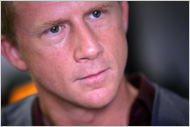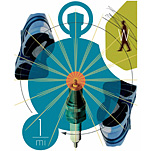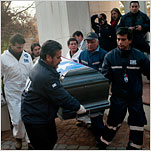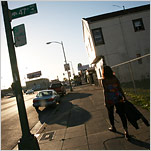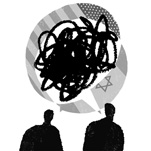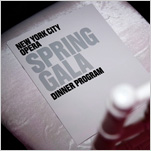Paul C. Bacon, a Democrat from Colorado with progressive political leanings, had only one policy when it came to the police: Avoid them.
He ran with people who “detested cops,” he said. He joined a protest at George W. Bush’s inauguration in 2001, waving a placard with a cartoon of the White House and an oil rig in the background, he said.
He thought that anyone who owned or used a gun “had some kind of personality problem.”
But in the wake of another experience in 2001, the terrorist attack on the World Trade Center, Mr. Bacon’s antagonism toward authority morphed into a yearning to serve the public. So, surprising himself, he became a New York City police officer, serving for 35 months, from July 2002 until May 2005. And he lived to write a book about it.
The book, “Bad Cop,” sometimes casts a critical eye on his former colleagues and their practices. Given his background, why should a reader not be skeptical of his account?
Because his duality gives him depth, he replied in an interview on Thursday at 1 Police Plaza.
“Somebody who’s been on both sides of the fence, I think, that’s the person you want to listen to,” said Mr. Bacon, a trim and energetic 40-year-old who has traded his gun belt for a surfboard, his Chelsea apartment for a Hawaii home.
“That’s the person who has something to add that’s maybe new,” he said.
Mr. Bacon’s recollections of the job ooze with contradictions: he champions officers as public servants but condemns some of their ingrained rituals. The job so exhausted him that he quit, and yet sometimes he misses it, he said. The book’s full title gives a hint of his divided feelings: “Bad Cop: New York’s Least Likely Police Officer Tells All” (Bloomsbury, 2009).
Anecdotes help flesh out his account, which is sometimes humorous and sometimes a sober analysis of police practices and policies.
Ticket writing is a kind of “subplot that pushes the story along,” he said in the interview. It is treated in most detail in three chapters, and most specifically on Pages 97 and 98, when a captain in the 32nd Precinct in Manhattan addresses officers at a roll call after a 4 p.m.-to-midnight shift.
The captain, a character that Mr. Bacon described as a “composite,” makes it clear that he wants them to issue more summonses, for things like traffic violations and quality-of-life offenses. “So I’ll just let you know that the crime that was happening on your tour has been shifting to the midnight tour, and anyone that doesn’t want to shift with it better bring up their numbers,” he says.
In the interview, Mr. Bacon also said he had never heard a police commander order a ticket quota, and never saw such an order “written on paper.” Officers learned of the minimum number that was expected, he said, by word of mouth from other officers.
And that number would change from precinct to precinct. When he was in the 28th Precinct in Manhattan, it was 20 or 25 per month, he said.
At the same time, Mr. Bacon defended commanders’ practice of pushing officers to write summonses: Most of them find the practice so uncomfortable, so fraught with conflict, that they would probably shirk the task otherwise, he said.
Mr. Bacon also writes about the controversial police practice of stopping people on the street to question and sometimes frisk them, and about the pressure on officers to “bring in a slew” of paperwork each night to prove that they were actually stopping people.
He writes, “The standard of proof required for this kind of stop was reasonable suspicion, a very low bar floating somewhere between probable cause and ‘he just looked like a perp’ — and tending toward the latter.”
But in the interview, Mr. Bacon revised his account, saying he should have written that it was actually behavior, not appearance, that was being judged. “It should say ‘he acted like a perp,’ ” he said, adding that he had seen no evidence of racial profiling in the practice.
Albert W. O’Leary, a spokesman for the Patrolmen’s Benevolent Association police union, who introduced Mr. Bacon to reporters, interjected at this point that it was fair to say that Mr. Bacon’s writing was meant as a humorous take on reality.
The book has some slapstick material.
Mr. Bacon employs some well-worn police lingo in relating his experiences, which he started logging in a computer on nights off from work. He describes turning into a “hairbag,” a term for a very experienced officer that is so old there is little agreement on its precise meaning or origin.
In the end, Officer Bacon, Shield No. 1627, accidentally locked himself in the back seat of a patrol car while napping — known as “cooping” — during an overnight security shift at 1 Police Plaza. The 911 operator he called for help on his cellphone burst out laughing at his predicament, he said. The incident helped convince him that he just wasn’t cut out for police work, and he resigned before he was qualified for a pension.
Mr. Bacon said he never met Police Commissioner Raymond W. Kelly.
Paul J. Browne, the Police Department’s chief spokesman, had little to say, beyond confirming that Mr. Bacon had worked there. “He joins the N.Y.P.D. and finds it’s too much for him,” Mr. Browne said. “That’s a book? Who says publishing’s dead?”


